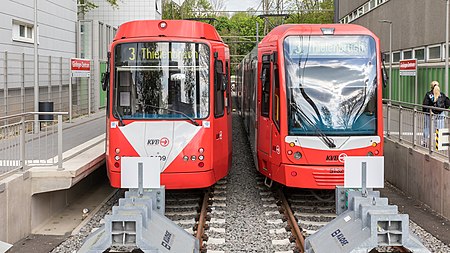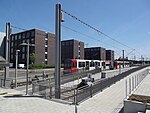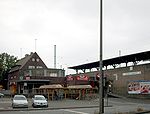Görlinger-Zentrum station
Cologne KVB stationsEhrenfeld, CologneGerman rapid transit stubsNorth Rhine-Westphalia railway station stubsRailway stations in Germany opened in 2018

Görlinger-Zentrum is the northwesternmost terminal station of Cologne Stadtbahn line 3, located in Cologne, Germany. The station lies in the Görlinger-Zentrum of the district of Bocklemünd. The station was opened on 27 August 2018 and consists of two side platforms with together two rail tracks. By lowering the tracks in the area of the terminal stop, a level access at sidewalk level was made possible. The new terminus was equipped with a 90-centimetre high platform for barrier-free access.
Excerpt from the Wikipedia article Görlinger-Zentrum station (License: CC BY-SA 3.0, Authors, Images).Görlinger-Zentrum station
Görlinger-Zentrum, Cologne Bocklemünd (Ehrenfeld)
Geographical coordinates (GPS) Address Nearby Places Show on map
Geographical coordinates (GPS)
| Latitude | Longitude |
|---|---|
| N 50.98055 ° | E 6.87047 ° |
Address
Görlinger-Zentrum
Görlinger-Zentrum
50829 Cologne, Bocklemünd (Ehrenfeld)
North Rhine-Westphalia, Germany
Open on Google Maps








